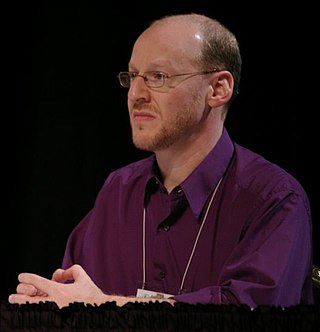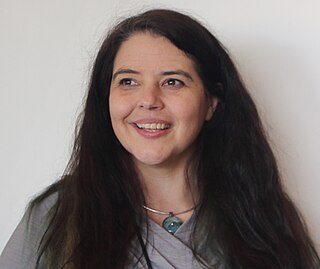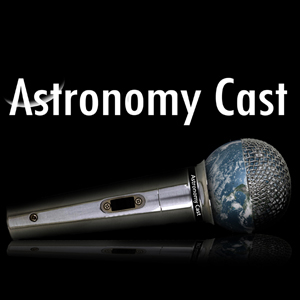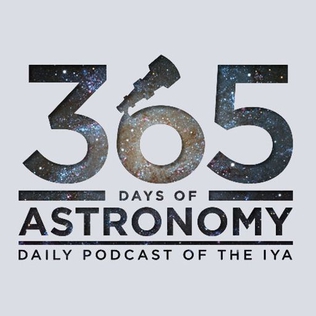Richard Charles Hoagland, is an American author and a proponent of various conspiracy theories about NASA, lost alien civilizations on the Moon and on Mars and other related topics. Hoagland has been documented to misappropriate others' professional achievements and is widely described as a conspiracy theorist and fringe pseudoscientist.

Philip Cary Plait, also known as The Bad Astronomer, is an American astronomer, skeptic, and popular science blogger. Plait has worked as part of the Hubble Space Telescope team, images and spectra of astronomical objects, as well as engaging in public outreach advocacy for NASA missions. He has written three books, Bad Astronomy, Death from the Skies, and Under Alien Skies. He has also appeared in several science documentaries, including How the Universe Works on the Discovery Channel. From August 2008 through 2009, he served as president of the James Randi Educational Foundation. Additionally, he wrote and hosted episodes of Crash Course Astronomy, which aired its last episode in 2016.

Skepticality is the official podcast of The Skeptics Society's Skeptic magazine. Beginning in May 2005, the podcast explores rational thought, skeptical ideas, and famous myths from around the world and throughout history. Each episode is an audio magazine featuring regular segments by contributors who are specialized in specific areas of critical thought followed by featured content which is usually in the form of an interview with a researcher, author, or individual who is helping promote skeptical thought and/or science in an effective way. It has featured interviews with James Randi, and scientists, such as authors and astronomers Phil Plait and Neil deGrasse Tyson, Greg Graffin from Bad Religion, Adam Savage from the MythBusters, songwriter Jill Sobule, author Ann Druyan and science communicator Bill Nye.
Jeffrey S. Medkeff, usually known as Jeff Medkeff, was a prominent science writer and educator. He was also a designer of robotic telescopes, a minor philanthropist, and an advocate of personal and sexual freedom.

The Skeptics' Guide to the Universe (SGU) is an American weekly skeptical podcast hosted by Steven Novella, MD, along with a panel of contributors. The official podcast of the New England Skeptical Society, it was named to evoke The Hitchhiker's Guide to the Galaxy. The show features discussions of recent scientific developments in layman's terms, and interviews authors, people in the area of science, and other famous skeptics. The SGU podcast includes discussions of myths, conspiracy theories, pseudoscience, the paranormal, and other forms of superstition, from the point of view of scientific skepticism.

Bad Astronomy: Misconceptions and Misuses Revealed, from Astrology to the Moon Landing "Hoax" is a non-fiction book by the American astronomer Phil Plait, also known as "the Bad Astronomer". The book was published in 2002 and deals with various misunderstandings about space and astronomy, such as sounds being audible in space.

David John Eicher is an American editor, writer, and popularizer of astronomy and space. He has been editor-in-chief of Astronomy magazine since 2002. He is author, coauthor, or editor of 23 books on science and American history and is known for having founded a magazine on astronomical observing, Deep Sky Monthly, when he was a 15-year-old high school student.

Pamela L. Gay is an American astronomer, educator, podcaster, and writer, best known for her work in astronomical podcasting and citizen science astronomy projects. She is a senior education and communication specialist and senior scientist for the Planetary Science Institute. Her research interests include analysis of astronomy data, as well as examination of the impact of citizen science initiatives. Gay has also appeared as herself in various television documentary series.

Astronomy Cast is an educational nonprofit podcast discussing various topics in the field of astronomy. The specific subject matter of each episode shifts from week to week, ranging from planets and stars to cosmology and mythbusting. Premiering on September 10, 2006, the weekly show is co-hosted by Fraser Cain and Dr. Pamela L. Gay. Fraser Cain is the publisher of the space and astronomy news site Universe Today and has a YouTube channel with over 200,000 subscribers. The other host, Dr. Pamela L. Gay, is a Senior Education and Communication Specialist and Senior Scientist for the Planetary Science Institute and the director of CosmoQuest. Each show usually has a length of approximately 30 minutes, and all shows, past and present, are accessible for download through the Astronomy Cast archive, as well as in podcast format.

Rebecca Watson is an American atheist blogger and YouTuber. She is the founder of the blog Skepchick and former co-host of The Skeptics' Guide to the Universe podcast. She also previously co-hosted the Little Atoms podcast.

365 Days of Astronomy is an educational podcast, inspired by the International Year of Astronomy, published daily beginning in 2009. It is produced as a collaboration between Southern Illinois University Edwardsville and Astrosphere New Media Association. The individual episodes are written, recorded, and produced by people all around the world. The podcast had 3,000–10,000 listeners each day.

George Joseph Hrab is a drummer, guitarist, composer and podcaster known for performing rock, funk and jazz and for exploring atheist, skeptic and science themes in his work. He has released six albums as a solo artist.

Desiree Schell is the host of the live Canadian call-in radio talk show and podcast "Science for the People". An advocate for scientific skepticism, Schell is a strong advocate of critical thinking and is strongly interested in the promotion of skepticism publicly. In her work as a labour organizer, Schell creates curricula and teaches courses on effective activism, drawing on the experience of other social movements.

Rogelio Bernal Andreo is a Spanish-American astrophotographer. He is known for his photographs of deep sky objects. His work has been recognized by NASA as a regular contributor to their Astronomy Picture of the Day (APOD) 80 times. Andreo's photography has been published in international magazines and periodicals, as well as television networks including the BBC, National Geographic, and the Discovery Channel series Into the Universe with Stephen Hawking.

Emily Stewart Lakdawalla is an American planetary geologist and former Senior Editor of The Planetary Society, contributing as both a science writer and a blogger. She has also worked as a teacher and as an environmental consultant. She has performed research work in geology, Mars topography, and science communication and education. Lakdawalla is a science advocate on various social media platforms, interacting with space professionals and enthusiasts on Facebook, Google+ and Twitter. She has appeared on such media outlets as NPR, BBC and BBC America.
The Northeast Conference on Science and Skepticism is a four-day conference focusing on science and skepticism founded in 2009 and held annually in New York City. NECSS is jointly run by the New York City Skeptics (NYCS) and the New England Skeptical Society (NESS). The Society for Science-Based Medicine joined as a full sponsor of the conference in 2015. As of 2016, attendance was estimated at approximately 500 people.

The Jodcast is a bimonthly podcast created by astronomers at Jodrell Bank Centre for Astrophysics (JBCA), University of Manchester in Manchester, England. It debuted in January 2006, aiming to inspire and inform the public about astronomy and related sciences, to excite young people with the latest astronomy research results, to motivate students to pursue careers in science, and to dispel stereotypes of scientists as incomprehensible and unapproachable.

Paranormality: Why we see what isn't there is a 2011 book about the paranormal by psychologist and magician Richard Wiseman. Wiseman argues that paranormal phenomena such as psychics, telepathy, ghosts, out-of-body experiences, prophesy and more do not exist, and explores why people continue to believe, and what that tells us about human behavior and the way the brain functions. Wiseman uses QR codes throughout the book, which link to YouTube videos as examples and as experiments the reader can participate in to further explain the phenomena. Because of a cautious American publishing market, it was only available in America through Kindle. Paranormality was awarded the Center for Inquiry's Robert P. Balles award for 2011.













